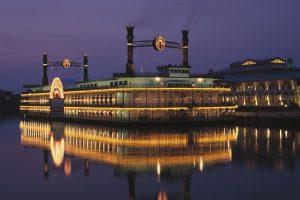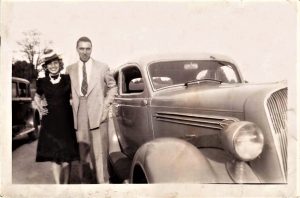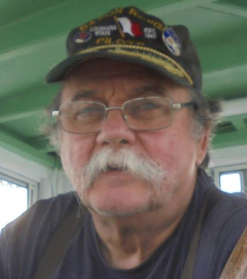The riverboat captain is a storyteller, and Captain Don Sanders will be sharing the stories of his long association with the river — from discovery to a way of love and life. This a part of a long and continuing story.
By Capt. Don Sanders
Special to NKyTribune
The third decade of the 21st Century arrived abruptly with someone firing a semi-automatic rifle of an undetermined caliber over on the Kentucky side of the river. The gunshots reminded me of another New Year’s Eve, 1995, on the Fox River aboard the leviathan gambling boat, the 330-foot GRAND VICTORIA I. At the stroke of midnight, the City of Elgin, Illinois changed the law making the discharging firearms within the city limits, while welcoming in the New Year, a felony instead of a misdemeanor. In spite of ample warnings, tales filled the news on New Year’s Day of shocked revelers knowing they were heading for hard-time in the “big house” instead of the local pokey.

The gunshots reminded me of another New Year’s Eve, 1995, on the Fox River aboard the leviathan gambling boat, the 330-foot GRAND VICTORIA I.
The well-rehearsed police response nabbed both the shooter and victim almost before I had time to return the phone to its cradle. A thorough search of the park along the river unveiled the location of more than a dozen stashed handguns. Both the shooter or shootee, both members of rival street gangs, refused to cooperate with the authorities. Later that year, when I had the option of leaving Elgin for command of the GRAND VICTORIA II on the Ohio River at Rising Sun, Indiana, or staying on the Fox River, in Elgin, as the Director of Marine Operations, the choice was simple. Twenty-some New Years later, I’m still on the Ohio River.

Another strange New Year’s Eve was observed aboard Captain John Beatty’s CLARE E. BEATTY inside the old Gallipolis Lock as 1970 melted into the coming year.
Another strange New Year’s Eve was observed aboard Captain John Beatty’s CLARE E. BEATTY inside the old Gallipolis Lock as 1970 melted into the coming year. Minutes before the strike of midnight, Cap’n Beatty called all of his small crew into the pilothouse, although the CLARE and all of “Beatty’s Navy’s” floating equipment floated inside the lock chamber. The grizzled, old riverman had been dour and unfriendly since leaving Cincinnati a couple of days before. But entering the wheelhouse, found the captain smiling, cordial, and in an almost festive mood.
He greeted us philosophically, adding:
“Wherever you are on New Year’s Eve, they say that’s where you’ll be spending the rest of your year.”
As the seconds ticked down to 1971, and the clock behind where I stood struck the hour, Cap’n John, wearing a broad smile on his face, reached overhead and tugged hard on the whistle pull. The prized set of finely-tuned Kahlenberg horns blew in the New Year with a reverberation Joshua might envy. As the last notes echoed off the concrete lock walls, Beatty let the whistle cord go, and without a further word, stared at the tow stretched ahead of the CLARE. Following a few minutes of silence, the bewildered crew began slipping out of the pilothouse to their duty stations without another utterance from the captain.

My earliest memory of a New Year’s Eve was the night the 1940s became the ‘50s when my mom and dad woke my brothers and me to join them in a toast to a new decade of promise.
My earliest memory of a New Year’s Eve was the night the 1940s became the ‘50s when my mom and dad woke my brothers and me to join them in a toast to a new decade of promise following the years of death and destruction of the Second World War and its aftermath of the forties. For some unknown reason, I’ve blocked the memory of why I pouted, refusing to join the family for a glass of Pepsi as the bells of Holy Cross Church rang in the promise of a better decade. Why, 70 years later, I still regret not toasting in the second decade of my life with my mother, father, and brothers Dick and Bob? I cannot answer that, but I nevertheless wish I had not missed that long-ago gathering around the kitchen table.
Only a few days before the New Year, a fellow I will call “Bill” sent an email inquiring whether my sternwheeler CLYDE was still available for purchase. We had exchanged messages several months earlier, and I was pleasantly surprised to hear from him again. Bill had family ties to Lancing, Iowa, I learned, but it wasn’t until a close friend who searched the “houses for sale” ads as a pastime came up with something that tied us all to the small Upper Mississippi River town.
“Here’s an older house in Lancing, Iowa, built by a steamboat captain. Have you ever heard of Lancing?”

Capt. J. W. Turner House, Lancing, IA – Nothing more was said about the steamboat captain’s digs on the Lancing city front until I asked Bill to see if he was familiar with the home.
“Sure,” I replied, I’ve been by it many times. Before I bought the CLYDE and brought her by the river to Aurora, Indiana, Lancing was as far south as she’d been.”
Nothing more was said about the steamboat captain’s digs on the Lancing city front until Bill’s recent email after I asked my realty friend to send me a link to forward to Bill to see if he was familiar with the home. So how does this tie-in with the New Year? Simple. I spent all New Year’s Day, 2020, corresponding with my house-finding-buddy, sending the information on to Bill while researching the home. Its builder, it turned out, was a celebrity in the rafting boat trade on the Upper Mississippi River at the same time the original 1870s CLYDE, the namesake of my boat, was hauling first-growth Wisconsin White Pine along the same watery route.
The steamboat captain, my house-hunter, a whiz at finding information on the computer, was Captain Jeremiah M. Turner, a prominent Lancing resident and businessman.
Cap’n Turner was born on December 24, 1837, in Dubuque, Iowa. His parents were Morris Turner, born in England, and Bridget Kelly, born in Ireland. He married Mary (unknown surname), born around 1843 or 1844 in Dubuque. Her parents were of German descent. In 1874 he built a Victorian-style residence on Front Street in Lansing, but they lived there only part-time until the 1890s,” according to a source we found. The Turner house was the same one currently listed in the “old home” ads, my inquisitor discovered.
After sending this information to Bill, he returned, “That’s my parent’s old place. They sold it around 2000. Great spot. I had my wedding reception there.”

Captain Jeremiah M. Turner, a prominent Lancing resident, and businessman, was born on December 24, 1837, in Dubuque, Iowa.
Captain Jeremiah also “established the first pearl button factory in Lansing, opening in May 1899. He continued his involvement in the factory well into his 80’s. It was superintended by his grandson, Leo Hufschmidt, who had been raised by J.M. & Mary when his mother Julia died the same year he was born. Mary Turner died between 1904 and J.M. lived with Leo for the remainder of his life.”
Pearl buttons, made from the shells of river mussels, were an important industry on the Upper Mississippi before the age of plastics made them obsolete. About every town on that stretch of the river had a button factory at one time.
The IOWA RECORDER newspaper of Butler County, Iowa, reported on May 30, 1928:
”From Lansing, Allamakee County comes the report of the death of Capt. J.M. Turner, veteran river pilot. Turner was known as the “dean of the river captains,” and held a pilot’s license from the Great Lakes to the Gulf of Mexico. During the later years, he owned a fleet of boats, two of which were named LILY TURNER and the PAULINE, after his two daughters. He was a contributor to the geological survey and was the author of several scientific articles. The Captain was personally acquainted with Abraham Lincoln and was present at the Wigwam in Chicago the night Lincoln was nominated for President. Another notable he numbered among his friends was Mark Twain, whom he considered a good humorist but a poor pilot. Turner was born in Dubuque and often laid claim to the honor of being the oldest native-born Iowan in the state. During the Civil War, he served with the Union forces as a river pilot, transporting troops.”

The Rafter GOLDEN GATE, built at Dubuque in 1878. Capt. J. W. Turner was on her in 1881-’82.
Much of the rest of New Year’s Day 2020, I spent pulling together the information my informer and I found concerning the original owner of the Lancing home. After examining Captain Frederick Way. Jr.’s STEAMBOAT DIRECTORIES for steam-powered packets and towboats, I uncovered a clue that, besides the LILY TURNER and the PAULINE, Captain Turner owned at least one other, and probably more, steamboats. Ways STEAM TOWBOAT DIRECTORY lists him affiliated with the rafter, GOLDEN GATE, built at Dubuque in 1878 and stated that “Capt. J. W. Turner was on her in 1881-’82, running Chippewa & Boom Co. rafts to Hannibal and St. Louis.” In 1895, the Missouri River Commission in Memphis bought the GOLDEN GATE.
Surprisingly, my search for various steamboat photograph collections found glass-plate prints of the LILY and the PAULINE, while in my collection of over 20,000 steamboat photos, a picture of the GOLDEN GATE lurked unseen until recovered.
In tribute to Captain Jeremiah M. Turner, I uncovered a page on the “Find a Grave” website where I uploaded a portrait of the once highly- acclaimed steamboat captain and started a memorial to him on the Ancestry genealogical site.
Where else would a retired steamboat captain be found on New Year’s Day in the third decade of the 21st Century than on the internet? Had Captain Turner been connected, I’ll say he would have used the net, too.
What do you think?
 Captain Don Sanders is a river man. He has been a riverboat captain with the Delta Queen Steamboat Company and with Rising Star Casino. He learned to fly an airplane before he learned to drive a “machine” and became a captain in the USAF. He is an adventurer, a historian, and a storyteller. Now, he is a columnist for the NKyTribune and will share his stories of growing up in Covington and his stories of the river. Hang on for the ride — the river never looked so good.
Captain Don Sanders is a river man. He has been a riverboat captain with the Delta Queen Steamboat Company and with Rising Star Casino. He learned to fly an airplane before he learned to drive a “machine” and became a captain in the USAF. He is an adventurer, a historian, and a storyteller. Now, he is a columnist for the NKyTribune and will share his stories of growing up in Covington and his stories of the river. Hang on for the ride — the river never looked so good.

























Captain Don, you tell a great story!
“Small world”yet again . i love how the river weaves through lives and brings us together. Thanks.Don for another great read.